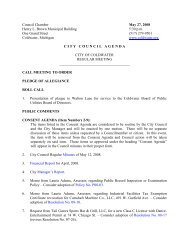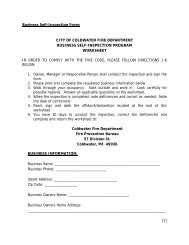Landlord Tenant Guide - State of Michigan
Landlord Tenant Guide - State of Michigan
Landlord Tenant Guide - State of Michigan
- No tags were found...
You also want an ePaper? Increase the reach of your titles
YUMPU automatically turns print PDFs into web optimized ePapers that Google loves.
The lawsuit for eviction is like any otherlawsuit. Once a Complaint is received, thetenant MUST APPEAR AND ANSWER by thedate on the Summons. The time period isshort—generally 3 to 10 days. The tenant mustanswer either in person, orally, or by filing awritten response addressing each <strong>of</strong> theallegations in the landlord’s Complaint. Thetenant’s answer generally objects to thelandlord’s reason(s) for the eviction andexplains why the court should not evict thetenant from the rental property. If the tenant does not appear at the districtcourt, as commanded in the Summons, adefault judgment—giving possession <strong>of</strong> therental property back to the landlord—will beentered against the tenant. And 10 days later,at the landlord’s request, the court will issuean Order <strong>of</strong> Eviction and a court <strong>of</strong>ficer willphysically remove the tenant and the tenant’spersonal items from the rental property.Additionally, the court may enter a moneyjudgment against the tenant. This would allowthe landlord to begin collection proceedings,which may include garnishment <strong>of</strong> wages, bankaccounts, and tax refunds. It may also includeexecution against the tenant’s personalproperty, like his or her automobile. Further, amoney judgment may appear on the tenant’scredit report, hindering his or her ability to geta loan or a credit card.Advice to the tenant: Do not fail toappear and answer! Up until trial, the parties may reach anagreement and settle the case themselves ORthey may decide to resolve their disputethrough mediation.Community Mediation. Parties can chooseto mediate before or after a lawsuit is filed.Mediation is an alternative dispute resolutiontechnique that is voluntary, empowering,confidential, convenient, effective, andprovided at little or no cost. (See pages 21-22for the names, locations, and phone numbers<strong>of</strong> the 24 <strong>Michigan</strong> Community MediationCenters that can be called for assistance.) At any time before trial, the landlord andtenant may decide to work out a compromise.In fact, most lawsuits for eviction end incompromise—minutes before trial. The partiesmay either:a) Sign an agreement called a “ConsentJudgment,” putting an end to the case byconsent and by order <strong>of</strong> the judge, ORb) Agree to a dismissal subject to somecondition (e.g., tenant paying rent by aparticular day, tenant voluntarily vacating therental property by a particular day). Once thecondition is satisfied, the judge will order thedismissal.If a Summons has been issued, the tenantmust show up at the court. If an agreement isreached, the court must be notified. Whetherthe landlord and tenant must appear beforethe judge to put their agreement on the recordis up to the judge. If the tenant has exhibited certain lawfulbehavior, <strong>Michigan</strong> law provides the tenantwith a number <strong>of</strong> defenses—even if thelandlord can prove any <strong>of</strong> the nine reasons fora lawful eviction. The most common defensesare:(1) A claim <strong>of</strong> retaliatory eviction. Thereexists a presumption <strong>of</strong> retaliation if the landlordstarted the eviction proceedings within90 days <strong>of</strong> the tenant trying to enforce his orher rights under law (e.g., reporting health andsafety code violations, exercising rights underthe lease, filing a complaint against thelandlord for violation <strong>of</strong> the law, or joining inmembership in a tenants’ organization).(2) Full payment <strong>of</strong> the rent due. After alawsuit for nonpayment <strong>of</strong> rent was filed, thetenant may have actually paid the total amount<strong>of</strong> rent due.(3) <strong>Landlord</strong>’s breach <strong>of</strong> the warranty <strong>of</strong>habitability and duty to repair. The landlordmust have been provided with notice <strong>of</strong> theproblem, generally in writing (see the lease),and must have been given a reasonableamount <strong>of</strong> time to fix the problem. If a portion





